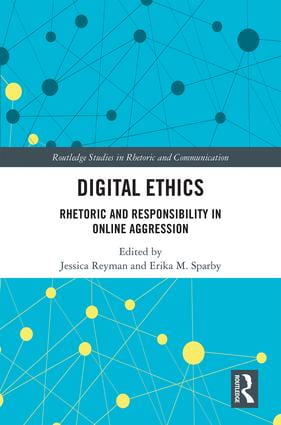Winner of the 2019 Computers and Composition Distinguished Book Award
Edited by Jessica Reyman and Erika M. Sparby

Digital Ethics delves into the shifting legal and ethical dimensions of digital ecologies and explores productive approaches for theorizing, understanding, and responding to difficult ethical issues online.
Contributions from leading scholars address how changing technologies and media over the last decade have both created new ethical quandaries and reinforced old ones in rhetoric and writing studies. Through discussions of rhetorical theory, case studies and examples, research methods and methodologies, and pedagogical approaches, this collection will further digital rhetoric scholars’ inquiry into digital ethics and writing instructors’ approaches to teaching ethics in the current technological moment.
A key contribution to the literature on ethical practices in digital spaces, this book will be of interest to researchers and teachers in the fields of digital rhetoric, composition, and writing studies.
Table of Contents
Foreword
James E. Porter, “Friends, Enemies, and Strangers Online”
Editors’ Introduction
1. Jessica Reyman and Erika M. Sparby, “Toward an Ethic of Responsibility in Digital Aggression”
In this introductory chapter, editors Jessica Reyman and Erika M. Sparby outline a historical overview of rhetoric’s commitment to ethics and point to the need for attention to the contribution digital rhetoric can make in approaches to aggression. They outline a proactive model for addressing digital aggression that engages platform designers and developers, social media managers and entrepreneurs, digital community leaders, moderators, and community members. This model acknowledges that the multidimensional nature of digital communication requires an ecological response to digital aggression. Reyman and Sparby argue that an ethic of responsibility in contexts rife with digital aggression requires platform-based tools that protect vulnerable groups alongside collective and collaborative management of digital aggression by users and communities.
Section 1. Ethics of Interfaces and Platforms
2. James J. Brown, Jr. and Gregory C. Hennis III, “Hateware and the Outsourcing of Responsibility”
Section 230 of the Communications Decency Act of 1996 created a regulatory environment in which companies such as Facebook, Twitter, and Google can claim that they are not publishers of content and are therefore not responsible for harmful content posted by users. Abusers and harassers have exploited this environment and the hands-off policies of software companies in order to turn software into a weapon. In this chapter, we argue that the actions of regulators and corporations have helped foster the creation of something we call hateware, software that employs policies, algorithms, and designs that enable abuse, harassment, and other harmful behaviors. In this chapter, we examine Discord, a text and chat application, that was used to plan the “Unite the Right” rally in Charlottesville, Virginia. By analyzing the unique features of this platform and how it was used by members of the so-called “alt right,” we argue that design decisions, policies, and community norms can transform seemingly “neutral” software into hateware.
3. Michael Trice, Liza Potts, and Rebekah Small, “Values versus Rules in Social Media Communities: How Platforms Generate Amorality on reddit and Facebook”
Trice, Potts, and Small examine the tension between rules-based moderation and value-based moderation as governance in online communities. This tension is explored through two rules-based groups that forgo clear ethics or values in how they govern their members: reddit’s GamerGate hub, KotakuInAction, and Facebook’s “shaming” communities. By examining the history of moderation, with a focus both on the WELL and organizational codes of ethics, the chapter postulates that much of online moderation has drifted from the 20th century’s focus on value-based purpose to an older, more individual desire-centered model. We look at the rules within these communities to explore how they push back against the stated values of their host platforms and the effect that has upon the communities themselves.
4. Tabitha London, Joey Crundwell, Marcy Bock Eastley, Natalie Santiago, Jennifer Jenkins, “Finding Effective Moderation Practices on Twitch”
With the rise of online social gaming platforms and communities, misogynistic and hostile behavior toward women within gaming communities has become more visible, including on Twitch.tv. Twitch is a popular livestreaming platform specializing in video game content that attracts millions of viewers daily. For this project, we used observation of four Twitch streams hosted by women and analysis of associated Twitch chat logs to assess moderation practices in relation to gendered harassment. Findings show that consistent and transparent moderation strategies are the most effective, especially strategies that involve community acts of moderation.
5. John R. Gallagher, “A Pedagogy of Ethical Interface Production Based on Virtue Ethics”
While digital writing and rhetoric scholars have critiqued interfaces from a design perspective and engaged speculative design, this chapter extends this work to the production of ethical interfaces through the framework of virtue ethics. Gallagher offers a pedagogy of ethical interface production for instructors who teach interface design and social media rhetoric. Ethical interface production asks students to identify virtues, or character traits, they deem to be ethical and then produce multiple interfaces that seek to inculcate such habits.
Section 2. Academic Labor in Digital Publics
6. Leigh Gruwell, “Feminist Research on the Toxic Web: The Ethics of Access, Affective Labor, and Harassment”
The Internet is, in many ways, a hostile place for women, people of color, and other marginalized groups. At the same time that the Internet has grown increasingly toxic, rhetoric and composition researchers have become more focused on understanding how the Internet may complicate research practices. Feminist research methodologies have been particularly influential in these conversations, as researchers have asked how best to enact ethical research practices in digital spaces. However, the field is yet to confront how the unique dynamics of online spaces may not only challenge feminist research methodologies but even endanger feminist researchers. Specifically, online issues of access, affective labor, and harassment present significant complications for the feminist methodological principles of reciprocity, reflexivity, and transparency. Drawing on case studies from Internet-based researchers, Gruwell thus presents practical, ethical guidelines that can guide feminist researchers who must navigate concerns of access, affective labor, and/or targeted harassment.
7. Vyshali Manivannan, “Maybe She can Be a Feminist and Still Claim her own Opinions? The Story of an Accidental Counter-Troll, A treatise in 9 movements”
In this autoethnographic account, Manivannan explores “academic trolling,” a variant that enfolds scholars trolling scholars, trolls trolling scholars, and scholars trolling trolls. Scholars trolling scholars is represented in Reviewer #2, the stereotypical representation of agonistic gatekeeping mechanisms of academic publishing that undermine the work of women, minorities, and researchers using nonconventional approaches. Despite this, academic culture positions itself as an arbiter of knowledge and morality. Thus, trolls view the academic community as hypocritical and highly exploitable for humor and for derailing a narrative about epistemological production and progressive tolerance. Trolls trolling scholars adopt Reviewer #2’s tactics to paint journalists and academic scholars—the major offenders in misrepresenting troll cultures—as corrupt, self-interested, hypocritical, and inconsequential, characterizations legitimized by academic culture. Finally, the author considers how trolls identified her as a potential target but presumed she was a white male based on her insider knowledge and prose; once they discovered her background, they were compelled to rationalize her ability to occupy their world while remaining a feminist academic. From this experience, the author explores the potential for academics to troll trolls via a restoration of the creative principle to language.
8. Jeff Rice, “Professorial Outrage: Enthymemic Assumptions”
Rice examines digital outrage as a rhetorical issue. It asks how enthymemic assumptions play into, in particular, professorial tweets and posts. In a study of two distinct cases, the chapter explores assumptions the professor makes when expressing outrage online as well as the assumptions audiences responding to the outrage make. The overall purpose of this examination is to more fully understand the assumptions audiences and posters make online.
Section 3. Cultural Narratives in Hostile Discourses
9. Megan Condis, “Hateful Games: Why White Supremacist Recruiters Target Gamers and How to Stop Them”
Condis provides a case study looking at how neo-Nazis attempt to rearticulate the beliefs, desires, and fears of a particular group (in this case, online gamers) that they are targeting for recruitment in order to make them seem to fit neatly into a white supremacist worldview. It is intended to serve as a template to help anti-racist activists and academics combat fascism and white supremacy more effectively by helping them to understand the rhetorical strategies that they will be facing.
10. Alisha Karabinus, “Theorycraft and Online Harassment: Mobilizing Status Quo Warriors”
Karabinus argues that the long history of gaming discourse provides a foundation for organizing political attacks and harassment campaigns by GamerGate actors and adjacent groups. By tracing tactics from historical actions by 4chan members through GamerGate and beyond, this analysis aligns GamerGate mobilization of social media with Christopher A. Paul’s (2012) examinations of theorycraft in MMORPGs: “These theorycraftesque approaches work from outside the game to change how it is played, potentially in ways that were not anticipated by developers, radically expanding the influential forces relevant to games” (p. 380–386). Analysis of GamerGate tactics on Twitter demonstrates how network actors were able to “game” the platform to maximize results, much in the same way dedicated players research and develop optimal strategies far beyond standard game content.
11. Bridget Gelms, “Volatile Visibility: How Online Harassment Makes Women Disappear”
In this chapter, Gelms theorizes “volatile visibility,” the correlation between a woman’s visibility online and the amount of harassment she experiences. To illustrate this concept in action, the author presents interviews with two women who have been negatively impacted by volatile visibility in both personal and professional ways. Each of these stories reveals what online harassment looks like for women on a day-to-day basis while exemplifying how online harassment works to maintain existing cultural boundaries that exclude women from public discourses. Therefore, the author argues that online harassment, in its influence on how we exist and interact online, effectually dampens women’s rhetorical influence and limits their opportunities for expression. This chapter, then, works to unmask the scope of harassment’s consequential and potentially irreversible impact on women and our digital public spheres.
Section 4. Circulation and Amplification of Digital Aggression
12. Brandy Dieterle, Dustin Edwards, and Paul “Dan” Martin, “Confronting Digital Aggression with an Ethics of Circulation”
Dieterle, Edwards, and Martin bridge scholarship in circulation studies and rhetorical ethics to more rigorously ask how digital rhetoric scholars can address ethical issues related to the circulation of social media content. Our argument proceeds in three parts. First, they argue that the act of circulating content is writing; it is a performative, curatorial, rhetorical, and material practice that invites participation, assumes an exigence and audience, prompts further circulation, and so on. Second, they position recirculating content as a world-building act that has implications for public discourse in an algorithmic age. Finally, they conceptualize an ethics of circulation, arguing that sharing preexisting writing assumes and constructs a rhetorical relationship with others and thereby deserves thoughtful contemplation about what such a relationship entails. Looking particularly at how circulatory practices can amplify harm and aggression as well as solidarity and support, we elaborate on our conception of an ethics of circulation by examining two case examples—the recirculation of Donald Trump body slamming CNN and the anti-racist work that circulated after the harassment of Leslie Jones. This chapter contributes to digital rhetoric by offering a richer understanding of ethics and digital circulation: in an all-things viral age, circulating writing is always shot through with ethical consequences.
13. Krista Kennedy and Noah Wilson, “The Banality of Digital Aggression: Algorithmic Data Surveillance in Medical Wearables”
Kennedy and Wilson examine essential medical wearables as a venue for digital aggression in the form of algorithmic data surveillance. Using the Starkey Halo smart hearing aid as a case study, the authors offer a nuanced investigation of bodily surveillance that examines benefits as well as substantial drawbacks for disabled wearers. Wearers of smart hearing aids interact daily with multiple algorithms that automatically adjust sound based on detection of ambient noise, Bluetooth-based media streaming, and satellite-based geolocation settings. The opacity of this network and the ethic of expediency that drives its design and deployment aggressively impose surveillance through banal data collection. The results pose complications for the wearer’s performance of meaningful consent and rhetorical agency, rendering the wearer a technocapitalist product rather than a human who is entitled to their own data. Our study explores the implications this aggression poses not only for wearers of essential medical technologies but also for wearers who opt in to data surveillance through ubiquitous health trackers such as Fitbits and Apple Watches.
14. Katherine DeLuca, “Fostering Phronesis in Digital Rhetorics: Developing a Rhetorical and Ethical Approach to Online Engagements”
DeLuca analyzes online communications in two rhetorical events on reddit.com and proposes a pedagogical approach that balances impulses toward hasty, rash communications, and compositions with prudent judgment and practical wisdom. I consider what instructors of digital rhetorics and writing, and related fields, might do to intervene in commonplace rhetorical behaviors and communicative practices to foster a rhetorical–ethical approach toward online communications that builds upon the ideas of scholars who have examined the circulation of digital texts (Bradshaw, 2018; Edwards, 2018; Gries, 2013; Ridolfo & DeVoss, 2009; Sheridan, Ridolfo, & Michel, 2012). To situate this rhetorical–ethical perspective as an active engagement and orientation by individuals toward others and the world around them, I compare two ways of knowing and rhetorically responding: mêtis, or cunning intelligence (see Dolmage, 2009; Edwards, 2018; Hawhee, 2004; Knudsen, 2005; Yergeau, 2017), and phronesis, or practical wisdom and prudent judgment derived from social practice and experience (see Aristotle, 2002; Knudsen, 2005; Moss, 2011; Sachs, 2002). I begin with mêtis as a way of exploring and characterizing how I see many digital citizens engage rhetorically in online spaces before turning to phronesis as an alternative mode of active engagement and ethical habit to foster through education.
Editors and Contact Information

Dr. Jessica Reyman
Associate Professor of Rhetoric and Professional Writing
Northern Illinois University
jreyman@niu.edu

Dr. Erika M. Sparby
Assistant Professor of Digital Rhetoric and Technical Communication
Illinois State University
emsparb@ilstu.edu